Lawyer Might Have Made the Biggest Mistake of His Career as Judge Notices Damning Details in Brief
A New York lawyer is facing possible court sanctions for presenting fictitious case law in a court filing.
Veteran attorney Steven Schwartz included a series of case law citations in a brief for an injury suit against Avianca Airlines earlier this year, according to WLS-TV.
The fake case law originated from the artificial intelligence program ChatGPT.
The program generated a series of fake court decisions that ultimately were included in Schwartz’s legal arguments.
Judge Kevin Castel of the Southern District of New York eventually realized neither the cases themselves or the internal citations were real, stating that they “appear to be bogus judicial decisions with bogus quotes and bogus internal citations.”
“The court is presented with an unprecedented circumstance,” the judge said of the situation in a May 4 court order.
The fake cases?
Varghese v. China South Airlines, Martinez v. Delta Airlines, Shaboon v. EgyptAir, Petersen v. Iran Air, Miller v. United Airlines and Estate of Durden v. KLM Royal Dutch Airlines.
Judge Castel proved unable to find legal documents associated with any of the case law, spurring skepticism over their existence.
Schwartz is facing a sanctions hearing on June 8 — and he’s taking responsibility for the legal goof.
The lawyer admitted he was a novice to ChatGPT in a subsequent affidavit — explaining that he “was unaware of the possibility that its content could be false.”
Schwartz “greatly regrets having utilized generative artificial intelligence to supplement the legal research performed herein and will never do so in the future without absolute verification of its authenticity,” according to a pre-sanctions hearing filing.
A lawyer used ChatGPT to do “legal research” and cited a number of nonexistent cases in a filing, and is now in a lot of trouble with the judge 🤣 pic.twitter.com/AJSE7Ts7W7
— Daniel Feldman (@d_feldman) May 27, 2023
The lawyer’s affidavit included screenshots of him asking ChatGPT whether the bogus cases were real — a question to which the program responded in the affirmative.
The judge has ordered Schwartz to show cause why he shouldn’t be punished “for the use of a false and fraudulent notarization” in the sanctions hearing.
The faulty use of the program could suggest that predictions of ChatGPT replacing human lawyers may be premature, according to The New York Times.
The program has been criticized for political bias, as well as an imperfect record in providing its users with accurate information.
Truth and Accuracy
We are committed to truth and accuracy in all of our journalism. Read our editorial standards.












